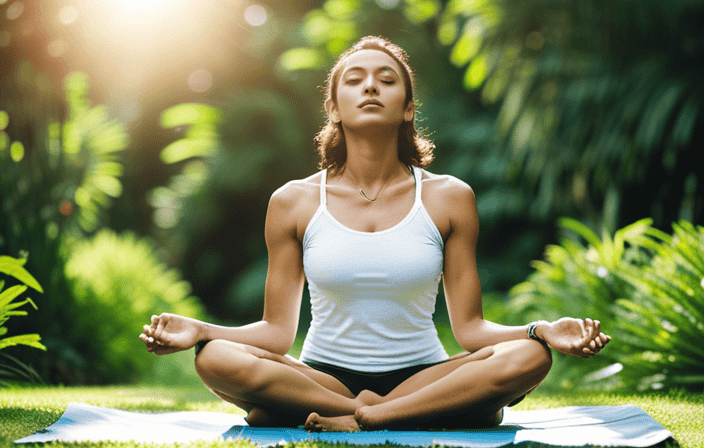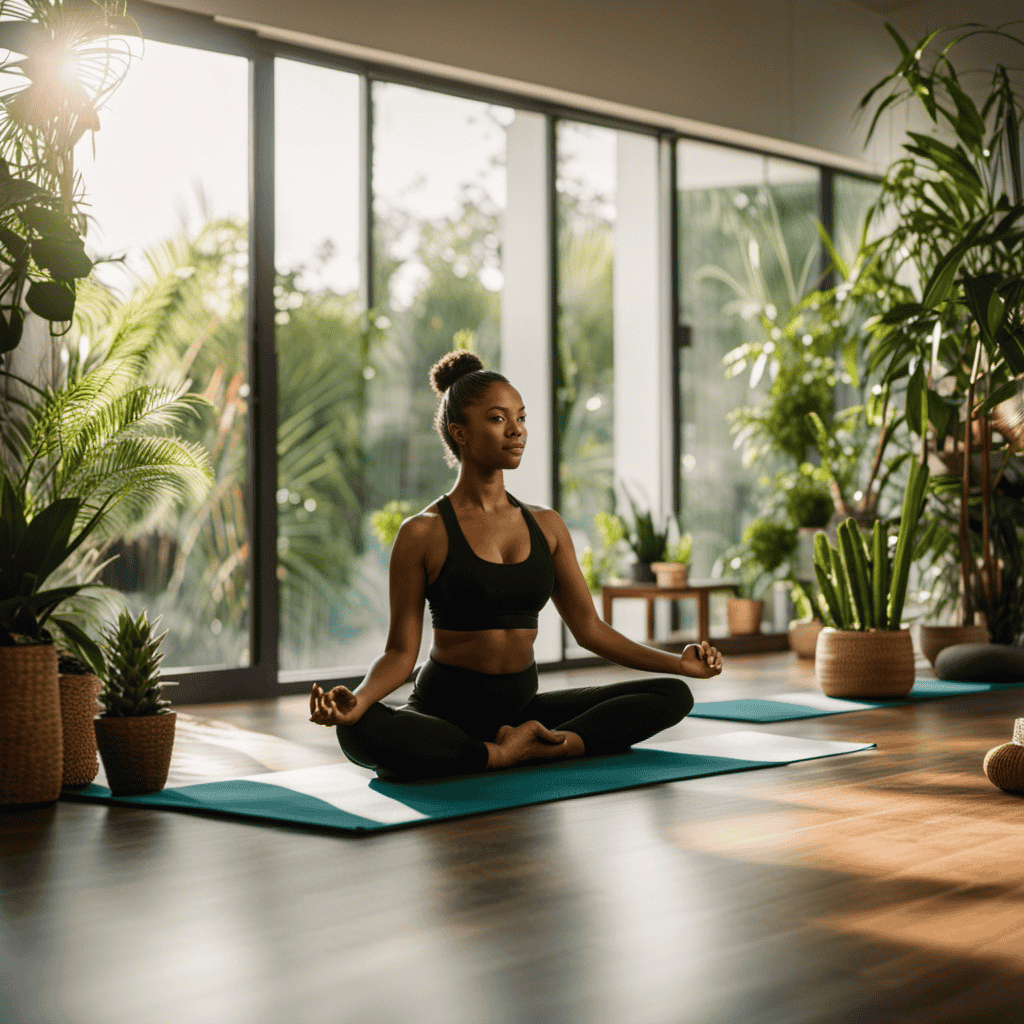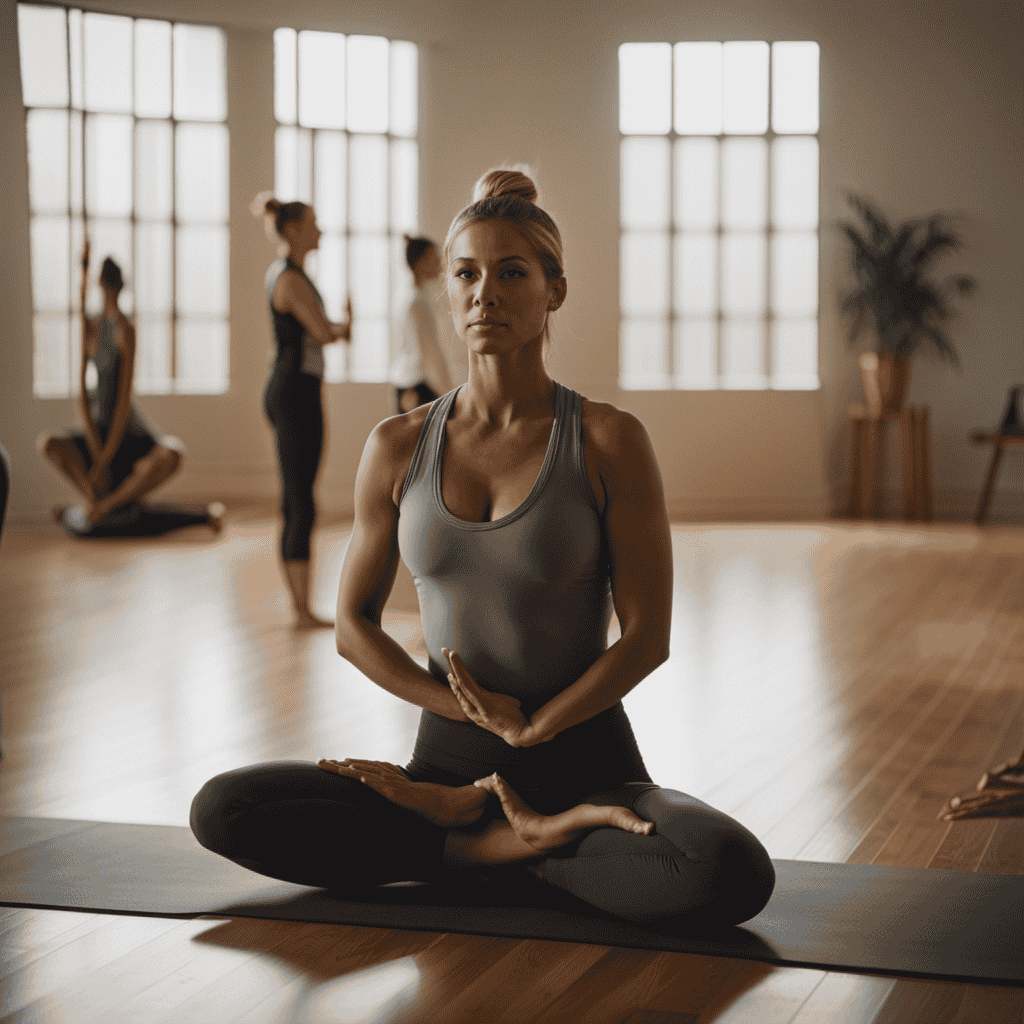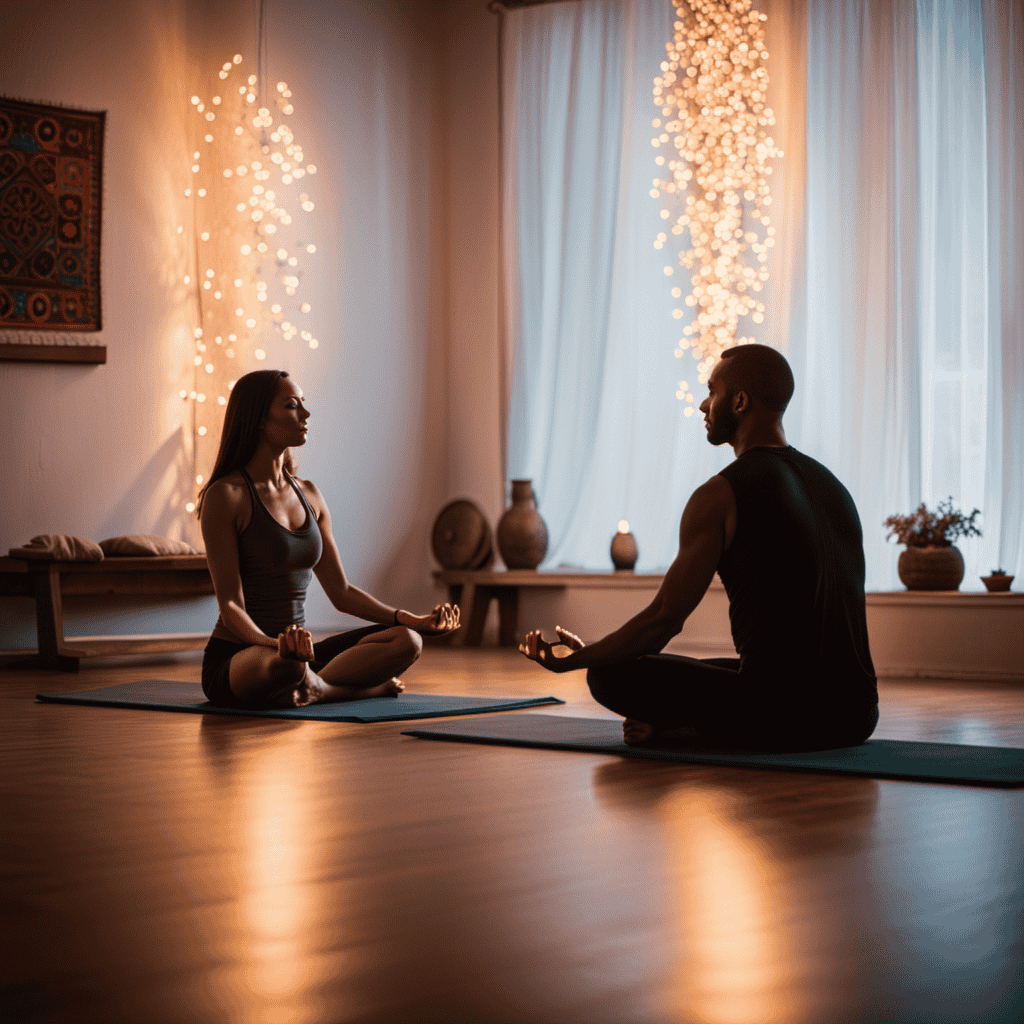Yoga, an ancient practice that harmonizes the mind, body, and spirit, is the key to unlocking our full potential and discovering a path to well-being.
As the saying goes, ‘Inhale the future, exhale the past,’ yoga offers a transformative journey towards self-discovery and inner peace.
Through its various styles and approaches, yoga provides a holistic approach to health, promoting physical strength, mental clarity, and emotional balance.
Join me as we explore the power of yoga and embark on a journey of self-care and transformation.
Key Takeaways
- Well-rounded practice combining asanas, pranayama, and meditation is the most effective approach to yoga.
- Beginners should aim for a frequency of 2-3 times per week to gradually adapt and minimize the risk of overexertion.
- Yoga can contribute to weight loss when combined with a healthy lifestyle, mindfulness, and certain styles that aid calorie expenditure.
- Restorative yoga is widely regarded as the most relaxing style, promoting relaxation, stress relief, and injury recovery.
Benefits of Yoga
Yoga has significant benefits for me. It increases my strength, flexibility, mindfulness, and relaxation. Through the practice of yoga, I have experienced a deep mind-body connection that has transformed my overall well-being.
The physical postures and poses, known as asanas, have improved my strength and flexibility. They allow me to move with ease and grace.
Additionally, yoga has cultivated mindfulness and a sense of presence in my daily life. It helps me navigate challenges with a calm and centered mindset.
This mind-body connection has also had a profound impact on my mental health. It reduces stress, anxiety, and promotes a sense of inner peace.
The power of yoga lies in its ability to holistically nurture and nourish both the body and mind. It offers a path to wellness and self-discovery.
Different Styles and Approaches
One of the most effective ways to enhance my well-being is by exploring the various styles and approaches of this ancient practice.
When it comes to yoga, there is a style for everyone, regardless of their fitness level. For beginners, Hatha yoga is a great starting point. It focuses on gentle movements and basic poses, making it accessible to all.
Vinyasa yoga, on the other hand, is more dynamic and fast-paced, perfect for those looking for a challenge.
For those seeking precision and alignment, Iyengar yoga is the way to go. It uses props to support the body and ensure proper form.
No matter which style I choose, the benefits of yoga remain the same – increased strength, flexibility, mindfulness, and relaxation.
So let’s roll out the mat and discover the style that resonates with me the most!
Frequency and Consistency
Finding a sustainable routine and maintaining consistency in my yoga practice is crucial for long-term success in improving my well-being. Regular practice allows me to experience the full benefits of yoga and helps me progress on my wellness journey.
Here are some key reasons why frequency and consistency are important in my yoga practice:
-
Progress and growth: Regular practice allows me to gradually improve my strength, flexibility, and mindfulness. It helps me deepen my poses, explore new variations, and achieve personal goals.
-
Mental and emotional well-being: Consistent yoga practice helps me find inner peace, reduce stress, and enhance my overall mental and emotional well-being. It allows me to connect with my breath, quiet my mind, and find moments of stillness and clarity.
-
Physical health: Regular yoga practice supports my physical health by improving my posture, balance, and coordination. It also boosts my immune system, increases energy levels, and enhances my overall vitality.
-
Motivation and accountability: By committing to a regular yoga practice, I stay motivated and accountable to myself. It helps me prioritize self-care, set aside dedicated time for my practice, and stay on track with my wellness goals.
-
Mind-body connection: Consistent practice strengthens the mind-body connection, allowing me to become more aware of my body’s needs and signals. It helps me cultivate self-compassion, listen to my body’s limitations, and make mindful choices on and off the mat.
By finding motivation and staying committed to a regular yoga practice, I am able to unlock the transformative power of yoga and experience profound improvements in my overall well-being.
So, let’s roll out our mats, breathe deeply, and embrace the beautiful journey that yoga offers us.
Yoga for Weight Management
Maintaining a consistent yoga routine has helped me effectively manage my weight and support a healthy lifestyle.
Yoga not only provides physical benefits but also contributes to weight management through mindfulness and stress reduction. By practicing yoga, I have become more aware of my body’s needs and have developed a better understanding of self-care.
Certain styles like Vinyasa, Power, or Hot yoga can aid in calorie expenditure, helping to burn calories and support weight loss. However, it’s important to remember that yoga alone is not a magic solution for weight loss.
It is most effective when combined with a balanced diet and regular physical activity.
Yoga has become an integral part of my life, and it has helped me maintain a healthy weight while promoting overall wellness.
Relaxation and Stress Relief
When I incorporate restorative yoga into my routine, I experience deep relaxation and relief from stress. Restorative yoga is a style that focuses on gentle, passive poses held for extended periods, allowing for maximum comfort and relaxation.
The use of supportive props further enhances the experience, allowing the body to fully surrender and release tension. During these restorative sessions, I am able to practice deep breathing techniques, which help me to calm my mind and find inner peace.
By consciously focusing on my breath, I am able to let go of any stress or worries that may be weighing me down. This practice not only helps me to relax in the moment but also carries over into my daily life, allowing me to approach challenges with a sense of calm and clarity.
Restorative yoga truly provides a sanctuary for me to unwind and find solace in the present moment.
The Eight Elements of Yoga
Practicing the eight elements of yoga has been transformative for my personal and spiritual growth. The philosophy behind these elements provides a comprehensive framework for developing a deeper understanding of oneself and the world around us.
Here are three key aspects of the eight elements of yoga:
-
Ethical principles and moral restraints (Yama): By practicing kindness, honesty, and non-violence, we cultivate a sense of integrity and compassion towards others.
-
Personal observances and self-discipline (Niyama): Through practices like cleanliness, contentment, and self-study, we foster self-awareness and inner strength.
-
Physical postures and poses (Asana): Asanas help us develop physical strength, flexibility, and balance, while also preparing the body for meditation and deeper states of consciousness.
By incorporating these elements into my yoga practice, I have experienced profound spiritual growth, increased self-awareness, and a deeper connection to the world around me.
Yoga philosophy provides a roadmap for living a more meaningful and fulfilling life.
Ethics and Self-Discipline
Incorporating ethical principles and self-discipline into my yoga practice has been instrumental in nurturing a sense of integrity and inner strength. Ethics in yoga guide us in making conscious choices that align with our values and the well-being of ourselves and others. It involves practicing kindness, truthfulness, non-violence, and non-greed. Self-discipline, on the other hand, empowers us to commit to our practice and stay focused on our goals. It requires dedication, consistency, and the ability to overcome obstacles. By embracing these principles, we cultivate a deeper connection to ourselves and others, fostering a harmonious and compassionate yoga community.
To better understand the importance of ethics and self-discipline in yoga, let’s take a look at the following table:
| Ethics in Yoga | Self-Discipline in Yoga | Benefits |
|---|---|---|
| Kindness | Dedication | Inner peace |
| Truthfulness | Consistency | Focus and clarity |
| Non-violence | Overcoming obstacles | Emotional balance |
| Non-greed | Commitment | Enhanced self-control |
By embodying these values and cultivating self-discipline, we not only enhance our yoga practice but also cultivate qualities that positively impact our daily lives.
Yoga Books and Resources
Now that we have explored the importance of ethics and self-discipline in yoga, let’s delve into the world of yoga books and resources.
As a yoga enthusiast, I understand the value of having reliable and informative materials to support my practice. For beginners, there are several recommended yoga books that can provide a solid foundation. These books offer detailed explanations of basic poses, breathing techniques, and meditation practices, making them essential tools for anyone starting their yoga journey.
Additionally, in today’s digital age, online yoga resources have become increasingly popular for home practice. Websites, apps, and online classes offer a wide range of yoga styles and guided sessions, allowing practitioners to access yoga anytime and anywhere. These resources provide convenience and flexibility, making it easier to maintain a consistent practice.
Whether through books or online platforms, the availability of yoga resources ensures that anyone can embark on their wellness journey with confidence and guidance.
Frequently Asked Questions
Can yoga help improve mental health and emotional well-being?
Yoga positively impacts mental health and emotional well-being. It promotes relaxation, reduces stress, and improves mindfulness. Regular practice enhances self-awareness, emotional balance, and overall psychological well-being. Yoga is a powerful tool for personal growth and healing.
What are some advanced yoga poses that can challenge experienced practitioners?
Advanced yoga poses are like mountains that challenge experienced practitioners. From arm balances like Crow Pose to inversions like Handstand, these postures require strength, balance, and focus. Push your limits and soar to new heights!
Is it possible to practice yoga every day without overexerting the body?
Practicing yoga every day can be done without overexerting the body by finding the right balance. Beginners should start with a few times per week, gradually increasing frequency. Consistency is key for reaping the benefits of a regular yoga practice.
How can yoga be beneficial for individuals with chronic pain or injuries?
Yoga for chronic pain and injuries can be beneficial by promoting gentle movement, strengthening muscles, improving flexibility, and reducing stress. It can also aid in pain management, enhance healing, and provide a sense of empowerment and self-care.
Are there any specific breathing techniques in yoga that can help reduce anxiety and promote relaxation?
Breathing techniques for anxiety include deep belly breathing and alternate nostril breathing. These techniques activate the body’s relaxation response, reducing anxiety and promoting relaxation. Incorporating them into a regular yoga practice can have profound benefits for overall well-being.
Conclusion
In conclusion, the power of yoga is undeniable. By embracing this ancient practice, I have discovered a path to overall wellness that has transformed my life.
Through the combination of physical postures, breath control, and meditation, I have found balance and harmony in my body and mind. The different styles and approaches offer flexibility and cater to individual preferences, ensuring a personalized journey.
Consistency and alignment with personal needs are key, allowing for long-term success and growth. Yoga has not only helped me manage my weight, but has also brought a sense of mindfulness, stress reduction, and inner peace.
Restorative yoga, with its gentle and passive poses, has become my sanctuary, releasing tension and reducing stress. The eight elements of yoga provide a comprehensive framework for personal and spiritual development, guiding me towards ethical principles, self-discipline, and a state of bliss.
With the abundance of yoga books and resources available, my journey continues to expand and evolve. Through the transformative power of yoga, I have found a path to wellness that nourishes my body, mind, and soul.









